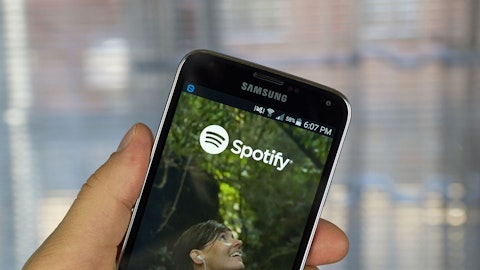Ben Kung: Yeah, I think I would just add that even in the most recent quarter, ads was just shy of the 20% mark. So we are getting quite close to sort of kind of almost parity growth rates between the two segments. I would just say that sort of in the near-term, we continue to see strong growth in supply and monetizable impressions. So we’re just very focused on making sure we’re optimizing across all channels to meet the growing demand as budgets continue to unlock sequential each quarter.
Bryan Goldberg: Okay, we’ve got a question now from Benjamin Black on Universal Music Group. Could you talk a little bit about your expanded relationship with Universal Music Group that was announced this quarter. What are the key benefits for you and where could we see the biggest impact to the financial model?
Daniel Ek: Yeah, I mean, generally speaking, we’re always just to set expectations. We’re always sort of working with our partners across all different content mixes and of course the major labels too. And a huge part of what we’re trying to do is operationally improve and allowing us for more flexibility to work together. And that means to allow the teams on the various side to give more opportunities to experiment on the platform with rights. And so a way of showcasing that is really, for instance, around the music videos that now are in, I believe, 11 or 12 markets around the world. So that’s a great way of just showing how we work with our label partners across the board. You’re also going to see music clips show up in a bigger way where artists are using ways of short-form storytelling on video, to tell a story around their album or tell fans about a new album drop that they should be pre-saving.
So there’s lots and lots of innovation that’s happening together with our label partners and artists alike. And UMG is obviously a very important partner to us just as the other major labels and independent labels are too. And I think long-term, the way to think about that from a financial impact point of view is really the more we can improve engagement, the more value we’re creating, the more ability we will have eventually to capture some of that value through price increases or more inventory that then drives advertising, which of course is to the benefit not just of Spotify, but is the benefit of the entire creative community.
Bryan Goldberg: All right, our next question is going to come from Rich Greenfield on music royalty rates. How does the recent launch of an audiobook $9.99 unlimited product impact your statutory music royalty rates? Why are publishers concerned?
Daniel Ek: Yeah, I mean, so first I talked about this, But a huge part in this next phase of Spotify is really to allow for more flexibility for consumers. So we went from a single plan $9.99 back in the day to then improving family plans, to then adding Duo, to then having day pricing, week pricing in certain markets and now you’re seeing an audiobook only tier and you’re going to see eventually a music only tier two. So that’s on the specific around the offering side. You will see a lot more sort of tiers that allows for more flexibilities to consumers to opt into the type of deal that they believe offers the greatest value for them in terms of how they’re using Spotify. Now, specifically to our content partners, while I won’t comment on any specifics, what I would say is that, of course, this is the sort of natural tension between suppliers and distributors.
There’s always a tension around payments. Now, to level set this, we did our loud and clear a while ago, but I think it’s important to note that Spotify in 2023 had record payouts to an entire creative community. And global publishing revenue will hit a record for 2023, and we will pay even more in 2024. So I feel really good about where we are relative to our partners and the fact that we are growing the creator ecosystem. And that still remains our goal. And I feel good about delivering on that goal too. So yeah, of course, there’s always going to be tension between that sort of supplier distributor thing. But I would say, we are on track for a better 2024 for songwriters and publishers. So I feel good about delivering lots and lots of value.
And relative to the CD era, publishers and songwriters are faring way better in this streaming economy. So I feel good about that.
Bryan Goldberg: Okay. Our next question is going to come from Jessica Reif Ehrlich on advertising. This past quarter, the Trade Desk called Audio, a key area of growth for their business, programmatic advertising is currently a small part of your business. Can you provide some color on the growth opportunity in programmatic and advertising in general?
Ben Kung: Thanks, Jessica. It’s a great question. We believe, as you sort of framed in your question, that programmatic is a growing and important part of the mix, and we’re bullish on this channel long term. It’s an opportunity really for all to participate, small, mid, large size enterprises and businesses across the board. As Daniel mentioned kind of in a prior answer, ads is still the smaller part of our mix and as you call out in your question, programmatic is also a small part of that smaller portion. Right now, as I said in my prior answer related to advertising, we just continue to sort of focus on optimizing across all formats and delivery channels to meet the opportunity where it is. In terms of near-term opportunity, again very focused on 2024, we continue to watch closely but are encouraged by what we’re seeing as advertiser budgets unlocking sequentially each quarter and we’ve got some good macro trends momentum heading into the summer in the second half with global events like the Euros, Olympics, amongst others.
Bryan Goldberg: Great. Okay, we actually have time for one more question and that’s going to be a follow-up from Jessica Reif Ehrlich on Christian Luiga. You recently announced Christian as your new CFO. Daniel, what in particular about Christian’s capabilities or skill set do you think will be most additive to Spotify and what will Christian’s top priorities be when he joins the company?





